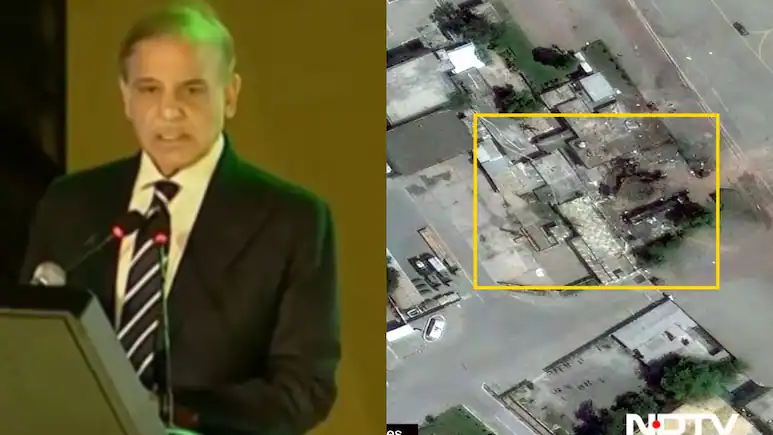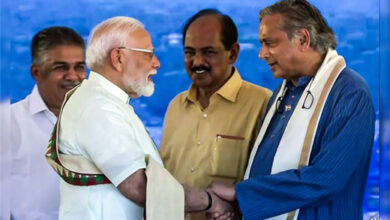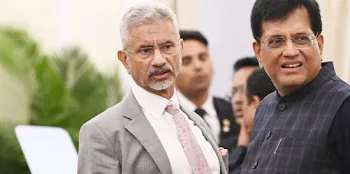“India Has Fired Missiles”: Pak PM Shehbaz Sharif Recalls 2:30 AM Asim Munir Telephone Call
Addressing a function in Islamabad, Mr Sharif recalled a 2:30 AM phone call from the Chief of Army Staff, General Syed Asim Munir, apprising him of the missile strikes fired by India.

New Delhi:
Pakistan Prime Minister Shehbaz Sharif in a rare public acknowledgment confirmed Indian ballistic missiles hit the Nur Khan Airbase and other targets within Pakistan in the early hours of May 10. Addressing a ceremony in Islamabad, Mr Sharif shared details of a 2:30 AM call from the Chief of Army Staff, General Syed Asim Munir, about the missile attacks from India.
“In the intervening night of May 9-10, at 2:30 AM, General Asif Munir phoned me over a secure line and informed me that India has fired its ballistic missiles. One has fallen on the Nur Khan airbase and some elsewhere,” Prime Minister Sharif declared in a public address.
The Nur Khan Airbase, situated halfway between Rawalpindi and Islamabad, is a strategic military base long at the heart of Pakistan’s air operations. Known earlier as Chaklala Airbase, it was also attacked by Indian forces during the 1971 Indo-Pakistan war.
“Pakistan PM Shehbaz Sharif himself confirms that General Asim Munir rang him up at 2:30am to tell him that India had struck Nur Khan Air Base and a number of other places. Let that absorb – the Prime Minister was awakened in the dead of night with reports of attacks deep within Pakistan. That says a lot about the magnitude, accuracy, and audacity of #OperationSindoor,” BJP spokesperson Amit Malviya posted on X, posting a clip of the Pakistani Prime Minister’s speech. The Indian attacks fell under Operation Sindoor, a retaliatory military operation initiated on May 7 in retaliation for the April 22 Pahalgam terror attack, where 26 Indians were killed. Government sources report that at least 100 terrorists belonging to terror outfits like Jaish-e-Mohammed, Lashkar-e-Taiba, and Hizbul Mujahideen were neutralized during the operation.
The campaign had the participation of the Indian Air Force (IAF), Indian Army, and Navy together acting against terror infrastructure and strategic military bases in Pakistan and Pakistan-occupied Kashmir (PoK). The targets were airfields, radar installations, and communication hubs at least in 11 identified locations.
Among the first to be attacked in the pre-dawn hours of May 10 were the PAF bases at Chaklala (Nur Khan) and Sargodha. Satellite imagery subsequently confirmed hits at Jacobabad, Bholari, and Skardu.
After the strikes, Pakistan retaliated with artillery fire across the Line of Control (LoC) and conducted several drone and missile attacks against Indian military bases in Jammu and Kashmir and sections of Punjab and Gujarat. This was followed by additional Indian strikes against Pakistani radar and logistics bases.
Indian intelligence intercepted Pakistani military communications at high alert level soon after the initial Indian wave of strikes. Intelligence analysts estimate that Pakistan was anticipating being hit by nuclear command-and-control nodes. Strategic Plans Division headquarters in Rawalpindi were said to have been placed on high alert.
In fear of escalation, Pakistan allegedly pleaded for instant US intervention.
The United States, via Indian government sources, instructed the Pakistani side to make contact through the official military hotline on the spot. Pakistan’s Director General of Military Operations (DGMO), Major General Kashif Abdullah, called Pakistan’s Indian counterpart, Lieutenant General Rajiv Ghai, in the afternoon of May 10. The call at 15:35 IST was later confirmed by Foreign Secretary Vikram Misri.
After the hotline exchange, India and Pakistan pledged to suspend all land, air, and sea-based military action as of the evening of May 10. Nevertheless, Indian air defense systems detected and shot down several Pakistani drones over Jammu and Kashmir and western Gujarat hours later.
Foreign Secretary Misri blamed Pakistan for breaking the ceasefire accord, saying that Indian military forces had made “appropriate and proportionate responses” and were ready for any further escalation.
India also repeated that suspension of the Indus Waters Treaty, made in reaction to the April 22 attack, still held and would not be withdrawn due to the ceasefire.






